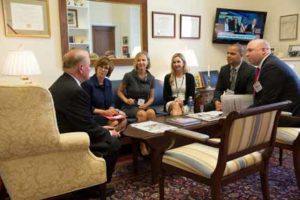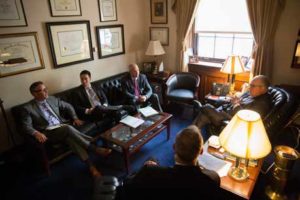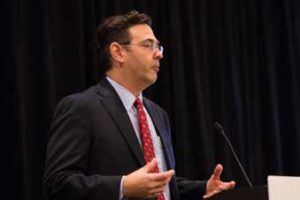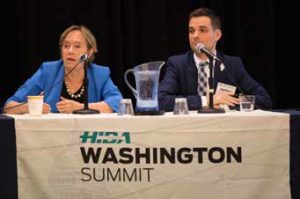HIDA Government Affairs Update
By Linda Rouse O’Neill, Vice President, Government Affairs
In June, HIDA hosted more than 85 leading distributor and manufacturer executives at its fourth annual Washington Summit. During this event, 72 attendees took part in 120 meetings with members of Congress and their staff, a new HIDA record.
Once again, HIDA staff and members were reminded of the powerful changes that can be accomplished through focused advocacy efforts. Participants met with members and staff of the Senate Finance and HELP (Health, Education, Labor, and Pensions) Committees, as well as the House Ways and Means and Energy and Commerce Committees. Meetings focused on key healthcare supply chain issues, including pandemic/emergency preparedness, wholesaler licensing standards, competitive bidding, and the medical device tax.

From left to right: Rep. Leonard Lance (R-NJ) meets with Emily Berlin, Cardinal Health; Dana Frank, Concordance Healthcare Solutions; Christine Skok, PDI; Leonard Swedarsky, Roche; and Malloy McDaniel, West Front Strategies.
Preparing the for pandemics/emergency public health events
In their meetings on Capitol Hill, participants educated policymakers on the critical role the supply chain plays in public health events from Ebola and H1N1 to Hurricane Sandy and the Boston Marathon bombing. They explained to lawmakers that the healthcare supply chain is extremely lean, so that ongoing efforts are needed to ensure greater elasticity when epidemics occur that strain available inventories.
This is an important effort as the Pandemic and All Hazards Preparedness Act (PAHPRA), which includes numerous public health programs and federal initiatives in to improve preparedness, is up for reauthorization next year. HIDA is asking that the PAHPRA Reauthorization direct HHS through the Strategic National Stockpile to create a commercial “cushion” of key products for preparedness through a private-public partnership. Implementing a product inventory process that determines need, what the commercial market can support, and identifies gaps is necessary to ensure continuity.
HIDA members ask Congress for competitive bidding support

From left to right: Scott Adams, Share Moving Media; Chol Pak, Thermo Fisher Scientific; Dave Myers, Concordance Healthcare Solutions; and Mark Zacur, Thermo Fisher Scientific meet with Rep. George Holding (R-NC).
HIDA members expressed deep concerns about the sustainability of Medicare’s competitive bidding program. In particular, participants noted that enteral nutrition, especially when provided in the skilled nursing facility setting, is not well suited for the program. Distribution leaders asked their representatives to sign a letter calling on HHS Secretary Tom Price and CMS Administrator Seema Verma to make needed changes that would guarantee the long-term stability of the program.
Participants call for wholesaler licensure standards
HIDA members asked Congress to implement a uniform national standard for licensing wholesale distributors of prescription medical devices. Specifically, they called for a measure that allows individual states to continue to license wholesale distributors. Meeting participants added that this measure should not require a separate prescription device license if the wholesaler has a pharmaceutical wholesaler license pursuant to the Drug Supply Chain Security Act (DSCSA).
Distribution leaders thank congress for medical device tax delay
HIDA members outlined how the two-year moratorium on the medical device tax has allowed them to invest heavily in research and development, as well as hire additional staff. They also asked that the tax be permanently repealed so they could continue these strategic investments.
In response to recent discussions about potential border adjustment tax policy, summit attendees educated lawmakers on the complexity of the healthcare supply chain. They explained how many products used in pandemic preparedness, lifesaving surgical procedures, as well as everyday medical measures, are made outside of the U.S. While HIDA does not have a position on any specific tax measure, meeting attendees asked that Congress carefully examine how any reform measure could affect the supply chain.
Key takeaways from policy speakers
On the second day of the Summit, lawmakers and experts shared their perspectives on key policy and industry issues. Among the key takeaways:
Paying for Medicaid is a growing challenge for states. Reps. Greg Walden (R-OR) and Ami Bera (D-CA) shared insights on how rising costs for Medicaid and other programs are constraining state budgets. They add that this pressure is causing states to seek more help from the federal government. Both lawmakers believe this challenge will become more acute as the national debt grows.
Provider consolidation has led to cost pressures for insurers. Jonathan Blum, CareFirst, discussed how the rise in hospital and physician practice mergers has led to growing costs for payers. During his presentation, Blum discussed how insurers are working with primary care physicians to control costs. He also shared observations about how physicians’ referral practices can affect the cost of care.

CareFirst Executive Vice President Jonathan Blum discusses the challenges payers face from provider consolidation.
Distributors can play a vital role in helping providers control costs. Nancy Foster, American Hospital Association, and James Michel, American Health Care Association, observed that distributors have access to a wide array of provider spending data, adding that this could help healthcare leaders better manage their organizations’ spending. As both acute and long-term care providers face growing challenges from federal regulations, distributors have the opportunity to deepen their customer relations by identifying new ways to find savings.

Nancy Foster, American Hospital Association, and James Michel, American Health Care Association, share how distributors can help providers improve efficiency.
While HIDA advocates on behalf of distributors through its partnerships with federal agencies and meetings with lawmakers year-round, attending the Washington Summit and connecting directly with your lawmaker is the best way to advance key industry initiatives. By meeting with lawmakers, distributors can put a human face on some of the most important healthcare supply chain issues.
